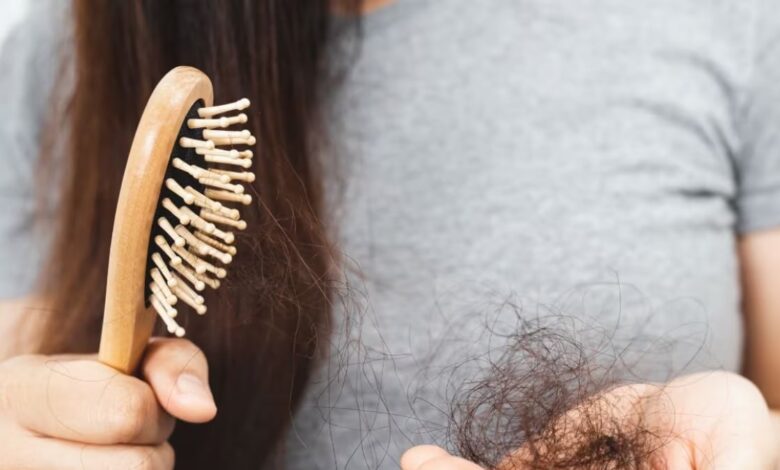Multifaceted Approaches To Managing PCOS: From Hair Loss To Regrowth – News18

Hair thinning and hair loss, often referred to as Female Pattern Hair Loss (FPHL), are common yet devastating symptoms of PCOS
Managing PCOS-related hair loss requires more than just a good shampoo
Polycystic Ovary Syndrome (PCOS) is like the unruly guest who overstays their welcome, disrupting everything from your hormones to your hairline. For many women, the most distressing symptom isn’t just the irregular periods or stubborn acne; it’s the hair thinning that sneaks up and chips away at their confidence. PCOS affects millions, yet its impact on hair is often overshadowed by other symptoms. Dr Rinky Kapoor, Dermatologist and Medical Advisor, QR678 dives into how this condition messes with your mane and explores holistic ways to reclaim your locks.
The PCOS puzzle: what’s going on?
PCOS is the most common endocrine disorder in women, but it is also one of the most misunderstood. The syndrome presents a smorgasbord of symptoms—from mild menstrual irregularities to severe reproductive and metabolic dysfunctions. The exact cause remains a mystery, but here are some of them:
- Hereditary Factors: If your mother or sister has PCOS, there’s a good chance you might develop it too.
- Surplus Insulin: Too much insulin can lead to increased androgen (male hormone) production, which disrupts ovulation and promotes hair loss.
- Low-Grade Inflammation: Chronic inflammation can stimulate androgen production, exacerbating symptoms like hair thinning.
PCOS and hair loss: the connection
Hair thinning and hair loss, often referred to as Female Pattern Hair Loss (FPHL), are common yet devastating symptoms of PCOS. Unlike male pattern baldness, which usually starts with a receding hairline, FPHL typically results in a diffuse reduction in hair density, particularly on the top of the head. The frustrating part? The frontal hairline often stays intact, creating an uneven and frustratingly noticeable thinning.
Types of PCOS and their hairy aftermath
Not all PCOS is created equal. Depending on the type, your hair might be more or less affected:
- Insulin-Resistant PCOS: The most common type, driven by high insulin levels, which prevent ovulation and increase testosterone production—a double whammy for hair loss.
- Inflammatory PCOS: Stress and environmental toxins lead to chronic inflammation, disrupting hormone balance and contributing to hair thinning.
- Adrenal PCOS: Less common but packs a punch with excessive androgen production, leading to severe hair loss, acne, and irregular periods.
Hair loss as a clue
Hair loss in PCOS often flies under the radar. According to a study done by QR678®, among the 150,000 patients treated for hair-related concerns, nearly 30% were diagnosed with FPHL, and of these, a staggering 90% were linked to PCOS. The condition is often discovered incidentally when women seek help for hair loss. This delayed diagnosis means that many women are left grappling with hair thinning without understanding the root cause.
The emotional toll of hair loss
Hair is more than just strands of keratin; it’s tied to our self-image and identity. For women, losing hair can be emotionally devastating, leading to decreased self-esteem, anxiety, depression, and social withdrawal. The psychological burden is especially heavy when hair loss is accompanied by other PCOS symptoms like acne, weight gain, and infertility. This makes addressing hair loss not just a matter of aesthetics, but a critical aspect of overall well-being.
Managing PCOS-related hair loss: a holistic approach
Managing PCOS-related hair loss requires more than just a good shampoo. It calls for a holistic approach that addresses the root causes while nurturing the scalp and hair:
Lifestyle Modifications: Diet and exercise are foundational. Reducing sugar intake, managing stress, and incorporating anti-inflammatory foods can help manage insulin levels and inflammation, tackling hair loss from the inside out.
Medications: Hormonal treatments like birth control pills may be prescribed to regulate hormones and reduce androgen levels. However, these are not always a silver bullet and should be complemented by other therapies.
Targeted hair treatments
- Low-Level Laser Therapy (LLLT): This non-invasive treatment uses low-level lasers to stimulate hair follicles and encourage growth by improving cellular function in the scalp.
- Platelet-Rich Plasma (PRP): Involves injecting your own platelets into the scalp to stimulate hair growth. It’s like giving your follicles a wake-up call.
- QR678: QR678 is a proprietary formulation containing biomimetic polypeptides that mimic natural growth factors in the scalp. It has been shown to promote hair regrowth and improve hair density, in multiple peer reviewed clinical studies.
PCOS is more than just a hormonal hiccup; it’s a complex disorder that can take a toll on every aspect of a woman’s life, especially when it comes to hair. The key to managing PCOS-related hair loss lies in understanding the condition’s multifaceted nature and adopting a holistic approach that goes beyond surface treatments. By addressing both the internal and external factors, women with PCOS can not only reclaim their hair but also restore their confidence and well-being.
Source link
